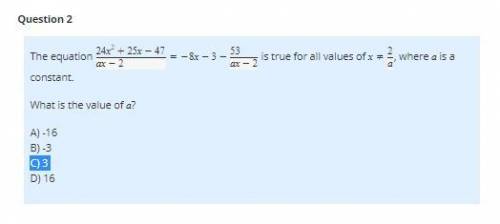The equation 24x2+25x−47
ax−2
=−8x−3−
53
ax−2
is true for all values of x≠
2
a
, where a is a constant.
What is the value of a?
A) -16
B) -3
C) 3
D) 16

Другие вопросы по теме Математика
Популярные вопросы
- Цыплята съедают 1 кг корма за 9 дней, утки за 6 дней, гуси за 2 дня. Сколько...
2 - Привет не понимаю что тут делать? Текст с историческими ошибками Вторая половина...
2 - В чем проявляется неразумность отношения человека к природе?...
2 - Амалдарды орында: -7,2:(-0,3)+6,12*(-3,2)...
3 - 22. Оберіть твердження, які стосуються Д. Вишневецького. A Походив із давнього...
2 - Скільки існує двоцифрових натуральних чисел,які дорівнюють сумі добутку й...
3 - Какая самая простая специальнасть врача?...
3 - » Під час привалу учні разом із дорослими ловили рибу на юшку. Після того...
1 - Http://doc.histrf.ru/19/russkaya-pravda-pestelya/ 1.Каковы были взгляды Пестеля...
3 - с английским (если что, это учебник 8 класса 2021 года) ☹️ 1a. Alesya, a...
3
ANSWER EXPLANATION: There are two ways to solve this question. The faster way is to multiply each side of the given equation by ax−2 (so you can get rid of the fraction). When you multiply each side by ax−2, you should have:
24x2+25x−47=(−8x−3)(ax−2)−53
You should then multiply (−8x−3) and (ax−2) using FOIL.
24x2+25x−47=−8ax2−3ax+16x+6−53
Then, reduce on the right side of the equation
24x2+25x−47=−8ax2−3ax+16x−47
Since the coefficients of the x2-term have to be equal on both sides of the equation, −8a=24, or a=−3.
The other option which is longer and more tedious is to attempt to plug in all of the answer choices for a and see which answer choice makes both sides of the equation equal. Again, this is the longer option, and I do not recommend it for the actual SAT as it will waste too much time.
The final answer is B.